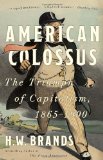
PREV ARTICLE
NEXT ARTICLE
FULL ISSUE
PREV FULL ISSUE
GREENBACKS, GOLD AND AMERICAN CAPITALISMPablo Hoffman of New York City writes:
Attached below is one of the always interesting daily excerpts from “Delanceyplace.com.” A (free) subscription is available to all.
At end of the American Civil War, the United States had become the world's largest economy. During the War, national wartime legislation banned state banks from issuing currency, introduced a national currency (the "greenback"), and imposed the first U.S. income tax which had the practical effect of supporting that currency. All of this centralized and boosted U.S. financial activity, and when durable transatlantic telegraphic connections were finally achieved in 1866 -- New York took a giant step toward its place as the center of the financial world: "The wartime measures diminished the anarchy in the [state bank currency based] money system, but considerable uncertainty remained. The constitutionality of [this] financial program was open to serious question. The Constitution said the federal government can 'coin' money. Did that mean it could print money as well? Did the proscription against state bank notes follow from the commerce clause, from the elastic clause, or from Treasury secretary Salmon P. Chase's imagination? As for the income tax, That seemed a patent violation of the constitutional ban on 'direct' truces not proportioned to population. "Until the courts settled the constitutional questions, the postwar financial markets faced the problem of accommodating the dual money system. Gold dollars and greenbacks competed directly with each other for the affections of merchants and investors, and indirectly for the affections of everyone else. ... The relative prices of the two currencies fluctuated according to the laws of supply and demand, and the fluctuating attracted speculators, who tried to anticipate the direction of the market. From anticipation to manipulation was a short, tempting step. "Gold transactions took place in a special room in the neighborhood of lower Manhattan that had become the financial hub of the country. In colonial days Boston had been the center of finance, followed by Philadelphia in the early national period. But New York's central location, its unsurpassed harbor, and the ambitions of the heirs of its Dutch founders made it a worthy rival to its northern and southern neighbors. "New York's traders organized themselves on Wall Street in the 1790s, gathering under a buttonwood tree to forge an agreement establishing rules for buying and selling bonds and shares of companies. The traders eventually moved indoors, gaining credibility with the growth of the city's economy, especially after the opening of the Erie Canal in 1825. The demise of the Philadelphia-based Bank of the United States (at the hands of Andrew Jackson) crippled New York's primary rival, and by the time California gold began flowing east, New York was the clear leader in American finance. The energy of its brokers in selling Union bonds during the Civil War cemented its primacy."
Thanks. Here's the description of delanceyplace from the web site. This could be of interest to E-Sylum readers who enjoy
reading about history and ideas. They're been publishing for ten years and have 150,000 subscribers. -Editor
Delanceyplace.com is a brief daily email with an excerpt or quote we view as interesting or noteworthy, offered with commentary to provide context. There is no theme, except that most excerpts will come from a non-fiction work, primarily historical in focus, and will occasionally be controversial. Finally, we hope that the selections will resonate beyond the subject of the book from which they were excerpted. To read the complete article, see:
Wayne Homren, Editor The Numismatic Bibliomania Society is a non-profit organization promoting numismatic literature. See our web site at coinbooks.org. To submit items for publication in The E-Sylum, write to the Editor at this address: whomren@gmail.com To subscribe go to: https://my.binhost.com/lists/listinfo/esylum All Rights Reserved. NBS Home Page Contact the NBS webmaster 
|
